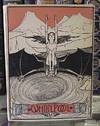
Opera Postuma, Quorum series post Præfationem exhibetur.
by SPINOZA, Baruch
- Used
- very good
- Hardcover
- first
- Condition
- Very Good/none
- Seller
-
San Diego, California, United States
Payment Methods Accepted
About This Item
[Amsterdam]: [Jan Rieuwertsz],, 1677. First edition. Hardcover. Very Good/none. First Edition of Spinoza’s Masterwork – Ethica, Ordine Geometrico demonstrata
SPINOZA, Baruch. Opera Postuma, Quorum series post Præfationem exhibetur. [Jan Rieuwertsz], [Amsterdam], 1677. TP + 18 leaves = Præfatio + half title + [1]-614 + 16 leaves = Index Rerum + half title + 1-112 + 4 leaves = Indiculus & Errata. First Edition.
Published in the year of Spinoza's death, this posthumous collection was edited by his close friend, Jarig Jelles, whose preface, originally written in Dutch, was translated into Latin by L. Meyer.
Spinoza had contemplated publishing his Ethica two years earlier but the furor over his supposed atheism forced him to postpone the book’s release. The day before his death, Spinoza arranged for these works to be published by sending them to Jan Rieuwertsz who had previously published his Principia on Descartes and the Tractatus-theologico-politicus.
In the Ethica, Spinoza sought to apply the "geometric method" and mathematical reasoning to metaphysics resulting in what is considered to be the first systematic exposition of pantheism wherein God is identified with the entire universe. This is the work upon which Spinoza's reputation as a philosopher, a rationalist and an atheist chiefly rests. In addition, the book contains the Politica, De emendatione intellectus, Epistolae, & ad eas responsiones, and the Compendium grammaticus linguae Hebraeae (with separate half-title and pagination).
“The Ethics is an ambitious and multifaceted work. It is also bold to the point of audacity, as one would expect of a systematic and unforgiving critique of the traditional philosophical conceptions of God, the human being, and the universe, and above all, of the religions and the theological and moral beliefs grounded thereon. Despite a dearth of explicit references to past thinkers, the book exhibits enormous erudition. Spinoza’s knowledge of classical, medieval, Renaissance, and modern authors – pagan, Christian, and Jewish – is evident throughout. Plato, Aristotle, the Stoics, Maimonides, Bacon, Descartes, and Hobbes (among others) all belong to the intellectual background of the work. At the same time, it is one of the most radically original treatises in the history of philosophy.” (Nadler, Spinoza, A Life, p. 226)
The book was prepared in great secrecy and issued a few months after Spinoza's death, with the author identified only by the initials. The place of publication and the publisher were not specified. The year after its publication, it was proscribed by the states of Holland and West Friesland for being atheistic and blasphemous. The following year, 1679, it was placed on the Index by the Vatican.
This copy is without the portrait that, at one time, was thought to be a rare and distinguishing mark that appeared in only a few copies of the Opera Posthuma. Subsequent scholarship has proved, however, that the portrait post-dates the publication of the Opera and is therefore an interesting but not an original part of the book. It is, in all cases, a later addition to the binding - sometime after 1680 or 1681 - since, according to the son of the publisher, the portrait was not engraved until three or four years after Spinoza's death (Rieuwertsz to Dr. Hallmann, see Die Lebensgeschicthe Spinozas, Leipzig, 1899, p. 232). This is eminently logical since it makes very little to sense to publish a book anonymously (without listing a publisher or city of origin) and then printing a named portrait and placing it opposite this title page
CONDITION: Original vellum with hand-scripted title to spine. Inscriptions in contemporary hand to title page. Some edge wear to vellum and some soiling to the covers. Tightly bound, bright & clean pages throughout. Very good. PHOTOS AVAILABLE UPON REQUEST.
PHOTOS AVAILABLE UPON REQUEST
PHOTOS AVAILABLE UPON REQUEST
Reviews
(Log in or Create an Account first!)
Details
- Bookseller
- Eternal Return Antiquarian Bookshop
(US)
- Bookseller's Inventory #
- 453
- Title
- Opera Postuma, Quorum series post Præfationem exhibetur.
- Author
- SPINOZA, Baruch
- Format/Binding
- Hardcover
- Book Condition
- Used - Very Good
- Jacket Condition
- none
- Quantity Available
- 1
- Edition
- First edition
- Publisher
- [Jan Rieuwertsz],
- Place of Publication
- [Amsterdam]
- Date Published
- 1677
- Weight
- 0.00 lbs
- Keywords
- radical enlightenment, philosophy, spinoza
- Bookseller catalogs
- Philosophy;
Terms of Sale
Eternal Return Antiquarian Bookshop
30 day return guarantee, with full refund including original shipping costs for up to 30 days after delivery if an item arrives misdescribed or damaged.
About the Seller
Eternal Return Antiquarian Bookshop
Biblio member since 2009
San Diego, California
About Eternal Return Antiquarian Bookshop
Rare and antiquarian bookshop specializing in philosophy and philosophical literature.
Glossary
Some terminology that may be used in this description includes:
- Vellum
- Vellum is a sheet of specialty prepared skin of lamb, calf, or goat kid used for binding a book or for printing and writing. ...
- Spine
- The outer portion of a book which covers the actual binding. The spine usually faces outward when a book is placed on a shelf....
- Errata
- Errata: aka Errata Slip A piece of paper either laid in to the book correcting errors found in the printed text after being...
- Leaves
- Very generally, "leaves" refers to the pages of a book, as in the common phrase, "loose-leaf pages." A leaf is a single sheet...
- First Edition
- In book collecting, the first edition is the earliest published form of a book. A book may have more than one first edition in...
- Title Page
- A page at the front of a book which may contain the title of the book, any subtitles, the authors, contributors, editors, the...

